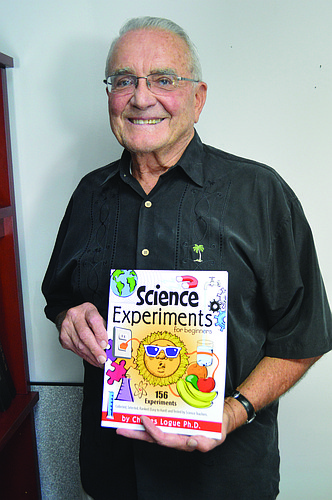- November 28, 2024
-
-
Loading

Loading

Americans rank 17th worldwide in science proficiency, and that’s a problem for retired educator Charles Logue.
“Americans have had professional shortages in science for a long time in most fields, and time is of the essence to raise the bar and elevate our academic standards,” he said.
Logue, a Longboat Key resident since 2004 who has a master’s degree in guidance counseling education and a Ph.D. in psychology and education, is trying to solve that problem.
He recently published his second book, “Science Experiments for Beginners,” which combines scientific data and experimentation with humor into an easy-to-read and hands-on lab book for students about to enter high school.
Logue’s book is an attempt to fix a problem he’s been familiar with for decades.
Logue has seen American students struggle with science in many different stages throughout their careers, and he’s aiming his book at an age group in which the he believes the problem starts.
Logue’s book is also filled with data showing the proficiency gaps American students have been facing compared with other countries. He believes awareness and education will lead junior high students to realize the importance of the field so that their interest will carry over to high school and college.
“For students to be successful in science at the college and high school levels, it needs to be made fun and understandable for them at an early age,” he said. “If we recognize the learning gap and the problems we’ve faced in recent years, we can begin the healing process.”
Science teachers and professionals from across the country helped Logue rank the experiments in his book from easiest to hardest, and the book is instructional and data-driven rather than just his own professional opinion.
“The experiments are very comprehensive and concise,” Logue said. “The sheer number of experiments in the book are carefully selected and allow the entire classroom to work on separate projects in an inquiry-based and hands-on environment.”
Logue began his career as an educator in Massachusetts, where his teaching skills caught the eye of a Saudi oil sheik whose daughter, Logue, he tutored. The sheik was so impressed with Logue’s work that he got him a job at the Mobil Oil Academy in Libya as a science teacher. Logue returned to the U.S. after two years and worked for Mobil as a human resources representative.
Logue received his doctorate in 1974, after going to school at nights because he worked during the day. He served as a department head with the Western Pennsylvania College of Education and on the faculty of the University of Pittsburgh.
Logue published his first book, “Outplace Yourself: Secrets of Executive Outplacement Counseling,” in the mid-1990s.
Science made funny
Charles Logue includes several jokes in “Science Experiments for Beginners,” including:
• He thought about telling one, but all the good chemistry jokes argon.
• Then, he was going to make a joke about salt, but he thought, “Na.”
• A neutron walks in a bar and asks the bartender the price of a drink. The bartender responds: “For you, no charge.”
• A photon checks into a hotel, and they ask him if they can carry his luggage. He says, “No thanks, I’m travelling light.”
• Who ever passed up the opportunity to call astronomers skyentists?